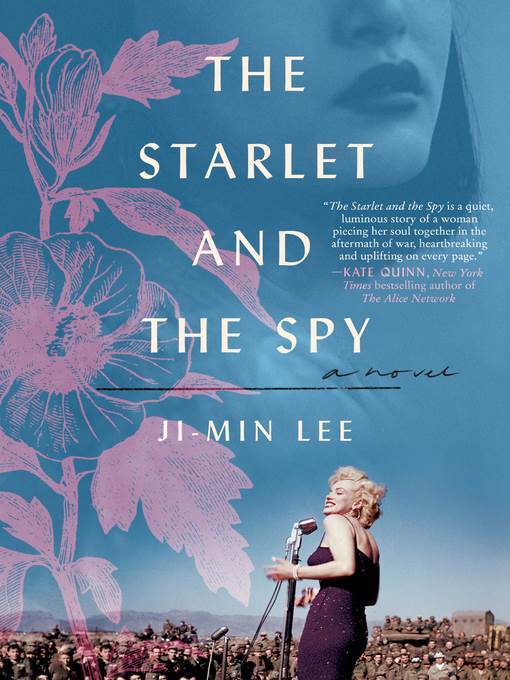
The Starlet and the Spy
A Novel
کتاب های مرتبط
- اطلاعات
- نقد و بررسی
- دیدگاه کاربران
نقد و بررسی

July 1, 2019
A South Korean interpreter recalls her war-torn love life while on tour with Marilyn Monroe. Lee, a screenwriter, has structured her short novel almost like an avant-garde film: The present action frames several flashbacks as the story follows an emotional, not a linear, arc. In 1954, the Korean War has ended and American forces occupy the South. For four morale-boosting days, Marilyn Monroe (the new Mrs. DiMaggio) is scheduled to visit Seoul and entertain the troops. First-person narrator Alice J. Kim (her nom de guerre), a translator and clerk on an American base, is tapped to serve as the star's interpreter. From here it is rough chronological sailing; readers are advised to cling to the date headings of each chapter as flotation devices. A talented artist born to wealth, Alice (real name Ae-sun) refused an opportunity to escape. When Northern forces seized Seoul, she survived for a time by drawing propaganda posters for the enemy but eventually endured bombardment, then captivity in a Northern POW camp. Torn between Yo Min-hwan, a married lover, and Joseph Pines, an American agent, she alienated both, and her clumsy revenge had unintended, dire consequences. She seeks redemption by searching for Chong-nim, an orphaned girl she had helped during the evacuation of Hungnam. She is also contemplating suicide for reasons it takes the entire novel to establish. Acknowledging that the Korean War is still "The Forgotten War," Lee, in this able translation by Kim, depicts several horrific episodes: neighborhoods in flames, hordes of refugees trying to escape the Communist invasion on overcrowded American ships, piles of corpses with those still living trapped beneath. The gritty truth is too often undermined by the banal love triangle, and Kim is perhaps overly fond of pronouncements like "A woman's beauty is powerful enough to change her fate, though it becomes useless as she grows old." The Marilyn frame story does pose revealing parallels between two outwardly privileged ingénues with inner scars. An intermittently chaotic novel which manages to snatch poignancy from the jaws of cliché.
COPYRIGHT(2019) Kirkus Reviews, ALL RIGHTS RESERVED.

July 8, 2019
Lee’s heartbreaking debut riffs on true events to tell the story of a brief connection between Marilyn Monroe and a Korean War survivor. Kim Ae-Sun has changed her name to Alice J. Kim, and in early 1954, less than a year after the cease-fire, she’s working as a typist and translator at an American military base in Seoul. When Marilyn comes to visit the troops that remain in the country, Alice is assigned to escort her to various functions, helping with organizing and translating. Observing and interacting with the glamorous movie star does little to soothe Alice’s memories of the loss of her youthful self, her two prewar lovers, and a child she had taken into her care after escaping a refugee camp. The atrocities of war—including the battles of her country and the bitter conflict within herself—continue to sear Alice’s thoughts after she’s located by one of her ex-lovers during Marilyn’s tour, and when she realizes he had worked as a spy, her world is shaken again. The presence of Marilyn doesn’t dominate the story, but when she helps Alice to face despair simply by the force of her personality, her impact is as dramatic as her short life. This is a well-told historical snapshot, but at the center is the author’s convincing portrayal of the pain Alice experiences. Lee’s touching examination of the long shadow of a war cast over one woman will leave readers intensely moved.

August 1, 2019
Translated by Kim, whose work has won multiple awards, Korean screenwriter and novelist Lee's first publication in English uses Marilyn Monroe's 1954 USO tour in Korea as a springboard for a lush tale of historical fiction. While Marilyn appears throughout, the story focuses on the fictional character of newly named Alice J. Kim (she was originally Kim Ae-Sun), who acts as Marilyn's interpreter during the tour. Alice's past unfolds before readers, who learn of her struggles as an independent woman in love with a married man--ironically, a well-regarded author and translator. Lee's writing traverses through some episodes of the grittiness of wartime and survival. Using the interaction between two women from vastly different walks of life, she forms connections between them and weaves a story that contains elements of despair, whimsy, and surprise. VERDICT Unique in its setting, mid-1950s Korea newly split by communism after two devastating wars, this brief novel will be appreciated by readers who enjoy historical context and/or strong female protagonists. [See Prepub Alert, 3/4/19.]--Shirley Quan, Orange Cty. P.L., Santa Ana, CA
Copyright 2019 Library Journal, LLC Used with permission.

August 1, 2019
In Korean novelist and screenwriter Lee's slim novel of extraordinary depth and sensibility, it's 1954 when Marilyn Monroe visits Korea on a USO tour, a year after the Korean War armistice. Alice is assigned to be her personal assistant and translator. In close proximity with the highly congenial Marilyn, Alice is catapulted into a reexamination of her own life, until figures from her past suddenly reappear. Marilyn's visit becomes a frame for Alice's larger story, allowing her the space to reflect and creating opportunities for her shadowy past to reenter her life. With great care and mastery of poetic language, translator Kim brings Lee's novel to English-language readers, a large swath of whom it will speak to. Lovers of historical fiction will appreciate Lee's attention to dates and details, while readers seeking intrigue will find plot aplenty, and it's all tangled in a tragic romance built up to epic proportions. Philosophically minded readers, too, will appreciate how Alice's moments of introspection provide keen insight into life's deepest questions.(Reprinted with permission of Booklist, copyright 2019, American Library Association.)

























دیدگاه کاربران